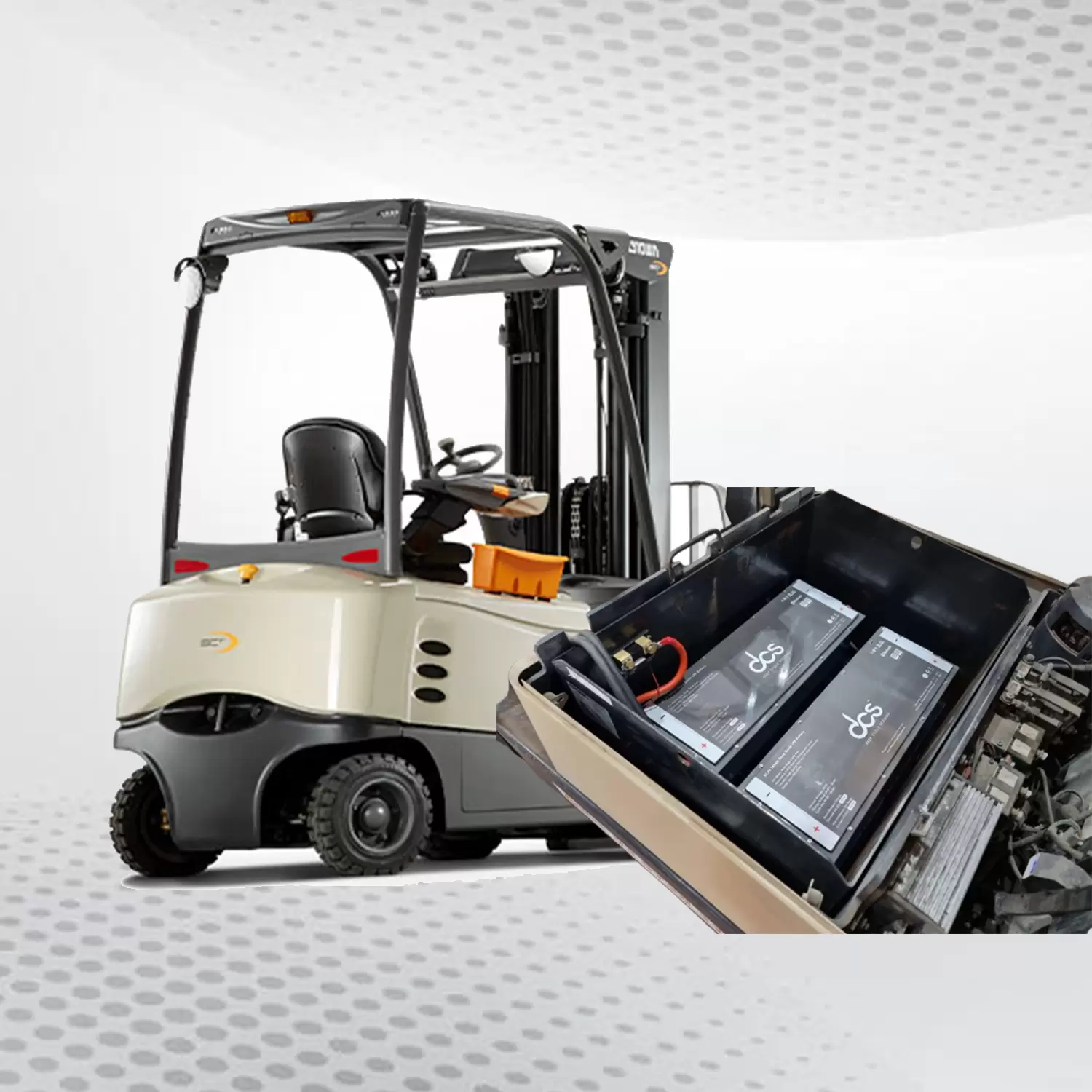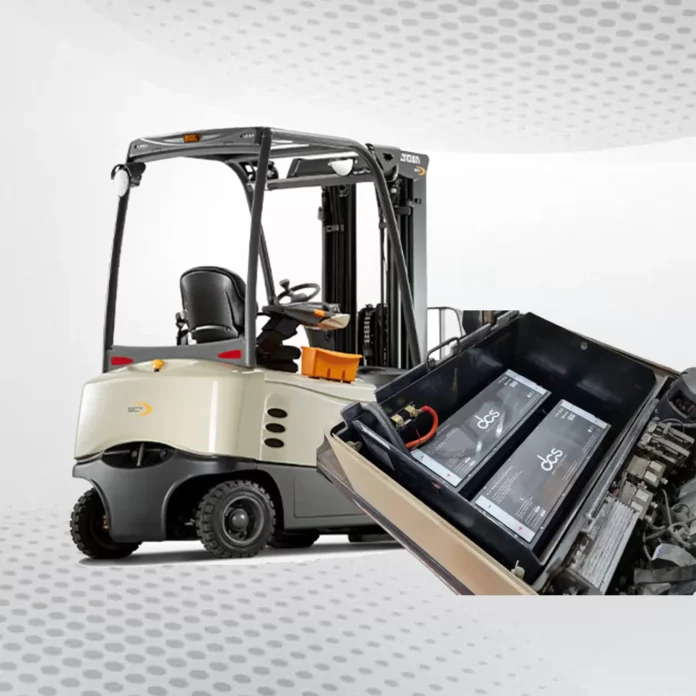In recent years, electric forklifts have been on the rise, with many companies opting for these sustainable alternatives to traditional diesel-powered machines. One key factor driving this shift is the adoption of lithium-ion forklift batteries, which offer a range of benefits over their lead-acid counterparts. This blog post will explore the impact of lithium ion forklift battery, highlighting their advantages, challenges, safety considerations, and more.
Introduction to Lithium Ion Forklift Batteries
Lithium-ion forklift batteries represent a significant advancement in the power source technology for electric forklifts. Characterised by their reliance on lithium ions moving between the anode and cathode within the battery, these power sources stand out for their superior energy density. This key attribute not only contributes to their compactness but also their lighter weight when compared to traditional alternatives.
Lithium-ion batteries’ design and operational principles facilitate rapid charging and offer an extended operational lifespan, which can significantly enhance the efficiency of material handling operations. These batteries have emerged as a pivotal element in the transition towards more sustainable and cost-effective solutions in the logistics and warehousing sectors.
With their adoption, organisations are poised to experience a notable shift in operational dynamics, underscored by reduced carbon footprints and enhanced energy efficiency. The utilisation of lithium ions as a fundamental component of their electrochemistry positions these batteries as a cornerstone in the evolution of electric forklifts, paving the way for innovations in industrial mobility.
 The Advantages of Lithium Ion Batteries in Forklifts
The Advantages of Lithium Ion Batteries in Forklifts
Lithium-ion batteries bring a suite of benefits to forklift operations, markedly enhancing the longevity and efficiency of these essential warehouse vehicles. A primary advantage lies in their extended lifespan, significantly surpassing traditional lead-acid batteries. This characteristic translates into notable cost efficiencies as the frequency of battery replacements diminishes.
Moreover, lithium-ion batteries’ compact and lightweight nature affords increased flexibility in the design of forklifts. Given the reduced size and weight constraints, such design innovations can lead to enhanced manoeuvrability and optimisation of warehouse space.
Another noteworthy benefit is the rapid charging capability of lithium-ion batteries, which ensures that forklifts spend more time in operation and less time docked at charging stations. This feature is instrumental in maintaining continuous workflow and productivity within the logistical operations.
Environmental Impact Of Forklift Battery Lithium Ion
Forklift battery lithium ion significantly decrease greenhouse gas emissions by powering electric forklifts. Unlike diesel-powered alternatives, these batteries operate without releasing carbon dioxide into the atmosphere during use, thus minimising the environmental impact of logistical operations.
Energy Efficiency
Thanks to their high energy density, lithium-ion batteries ensure a more efficient energy conversion, reducing waste during the charging and discharging. This efficiency conserves energy and reduces the electricity consumption required for charging, further contributing to environmental sustainability.
Fewer Hazardous Materials
Lithium-ion batteries contain fewer toxic materials compared to traditional lead-acid batteries. This attribute makes them safer from an environmental perspective and simplifies the disposal and recycling process, thereby reducing potential harm to the ecosystem.
Longevity
Lithium-ion batteries’ extended lifespan means fewer units must be produced and disposed of over time. This longevity helps reduce the demand for raw materials and minimises waste, aligning with sustainable production and consumption practices.
Recyclability
A considerable advantage of lithium-ion forklift batteries is their recyclability. Once they reach the end of their lifecycle, the materials within these batteries can be recovered and reused, reducing the need for new raw materials and lessening the environmental impact.
Renewable Energy Integration
Lithium-ion batteries are well-suited for integration with renewable energy sources, such as solar or wind power, for charging. This synergy enables operations to further reduce their carbon footprint by leveraging clean energy, thus enhancing the overall sustainability of forklift operations.
Cost Implications and ROI Analysis
Adopting lithium-ion technology for forklift batteries involves evaluating the initial investment against long-term savings and operational benefits. The upfront cost of these batteries is higher relative to traditional lead-acid counterparts. However, the batteries’ extended service life offset this expenditure, reducing the need for frequent replacements.
Additionally, the superior energy efficiency of lithium-ion batteries translates to lower energy costs over time, contributing to a more favourable return on investment (ROI). Organisations also benefit from increased productivity due to reduced downtime for charging and less frequent battery changes.
This boost in operational efficiency contributes to overall cost savings. Furthermore, the minimal maintenance requirements associated with lithium-ion batteries reduce ongoing operational expenses. Consequently, companies transitioning to lithium-ion forklift batteries can anticipate a compelling ROI driven by long-term operational cost reductions and enhanced warehouse and logistics operations efficiency.
Operational Efficiency And Productivity: Li Ion Battery Forklift
Li ion battery forklift significantly enhance operational efficiency and productivity within warehouse environments. The hallmark of these batteries, rapid charging capabilities, enables forklifts to return to operation without lengthy delays, thereby maximising uptime. This attribute is crucial in high-demand settings where equipment availability directly impacts logistical throughput.
Furthermore, the prolonged run times afforded by the high energy density of lithium-ion batteries ensure that forklifts can operate for extended periods without frequent recharging breaks. This continuous operational capacity is instrumental in sustaining workflow momentum and meeting tight schedules in warehouse operations.
Additionally, lithium-ion technology’s reduced weight contributes to improved forklift handling and agility, facilitating faster movement and more efficient task execution. These factors culminate in notable productivity gains, positioning lithium-ion forklift batteries as a critical driver in optimising warehouse and logistics activities.
Challenges and Concerns with Lithium Ion Forklift Batteries
While lithium-ion forklift batteries offer a multitude of benefits, they also present several challenges and concerns that require consideration. The initial cost of these batteries can be considerably higher than traditional lead-acid options, posing a significant investment for businesses. Additionally, despite their overall safety, there is a potential risk of thermal runaway—a condition where the battery overheats, leading to a risk of fire or explosion if not properly managed.
This necessitates strict adherence to safety protocols and proper handling. Moreover, implementing lithium-ion technology demands specialised charging infrastructure, which might involve additional expenses and logistical planning for integration into existing operations.
Organisations must evaluate these factors thoroughly to ensure that the switch to lithium-ion batteries aligns with their operational capabilities and financial planning, acknowledging that the benefits often counterbalance the initial outlay and logistical adjustments.
Safety Considerations: Lithium Ion Batteries For Forklifts
It is imperative that operators and maintenance personnel receive thorough training on the specific characteristics and handling requirements of lithium ion batteries for forklifts to ensure safe operation.
Regular Inspections
Regular inspections of the battery and its connections can help identify potential issues before they escalate into safety hazards.
Adequate Ventilation
Ensuring that charging areas are well-ventilated can help dissipate any heat generated during the charging process, minimising the risk of thermal events.
Use of Protective Equipment
Employees should wear appropriate protective equipment, such as gloves and eye protection, when handling lithium-ion forklift batteries to prevent injuries.
Emergency Response Plan
Facilities should have a clear and practised emergency response plan detailing the steps to be taken in case of a battery incident, including fires or leaks.
Correct Charging Procedures
Adhering to manufacturer-recommended charging procedures and using compatible charging equipment is crucial to maintaining battery integrity and preventing overheating.
Integration with Warehouse Management Systems
Leveraging lithium-ion forklift batteries within warehouse management systems enables sophisticated operational oversight. This integration allows businesses to access invaluable real-time insights regarding battery performance, such as state-of-charge, health status, and efficiency metrics. These data points facilitate the optimisation of battery usage and enhance the strategic planning of charging schedules, ensuring that forklifts are always ready for peak performance when needed.
Additionally, monitoring battery health in real-time allows for proactive maintenance, reducing the risk of unexpected downtime and extending the battery’s operational lifespan. This seamless melding of technology ensures that logistics operations are more efficient and more responsive to the demands of modern warehouse environments.
Maintenance And Care For Electric Forklift Lithium Ion Battery
Ensuring the optimal performance and longevity of electric forklift lithium ion battery necessitates a regime of diligent maintenance and care.
- Regular inspections are pivotal. They aim to identify and rectify potential issues, such as loose connections or signs of damage that could compromise the battery’s functionality.
- Adherence to proper charging practices is also crucial; batteries should be charged according to the manufacturer’s guidelines, avoiding overcharging or deep discharging, to maintain their health and efficiency.
- Monitoring the battery’s state of charge and temperature during charging cycles helps prevent overheating and maximising battery life.
- Additionally, keeping the battery and its terminals clean from debris and corrosion contributes to safe and efficient operation.
- Implementing these maintenance practices ensures that lithium-ion forklift batteries continue to provide reliable service, supporting the operational demands of modern warehouses and logistics centres.
Efficient Disposal of Lithium Ion Forklift Batteries
The appropriate disposal of lithium-ion forklift batteries marks a critical step in ensuring environmental stewardship. Upon reaching the end of their usable life, these batteries must be handled with care to prevent any adverse environmental effects. Recycling programmes provided by many battery manufacturers facilitate the responsible processing of these batteries.
Such initiatives ensure that valuable materials can be recovered and repurposed, thus mitigating the need to extract new raw materials. Businesses must engage with certified recyclers who adhere to environmental regulations to manage the disposal process.
By doing so, the potential release of harmful substances into the ecosystem is significantly reduced. This approach aligns with sustainable waste management practices and reinforces the commitment to environmental responsibility within the logistics and warehousing sectors.
Conclusion
The embrace of forklift battery lithium ion technology signifies a transformative phase for the industry, underpinning a move towards more eco-friendly and efficient material handling solutions. Despite the challenges, such as the initial investment and the need for specialised charging infrastructure, the long-term benefits, including substantial operational efficiencies and environmental advantages, position these batteries as a pivotal development. As companies navigate the transition, focusing on safety, proper maintenance, and responsible disposal practices ensures that lithium-ion forklift batteries enhance operational capabilities and align with broader sustainability goals.
FAQs
What Is The Lifespan Of Lithium Ion Forklift Batteries Compared To Traditional Batteries?
Lithium-ion forklift batteries generally have a significantly longer lifespan, often up to three times longer than traditional lead-acid batteries. This extended lifespan reduces the need for frequent replacements.
Are Lithium Ion Batteries For Forklifts Environmentally Friendly?
Lithium-ion batteries are considered more environmentally friendly due to their higher energy efficiency, reduced greenhouse gas emissions during use, and better recyclability at the end of their life than lead-acid batteries.
Can Forklift Battery Lithium Ion Be Charged Faster Than Traditional Batteries?
Forklift battery lithium ion offer rapid charging capabilities, allowing forklifts to return to operation quicker, thus minimising downtime. This feature is particularly beneficial in high-demand logistic environments.
| Other Good Articles to Read |
| Blogs-Nation |
| Blogs-Peoples |
| Bryan Smith Blogs |
| Intellect Blogs |
| The Fault In Our Blogs |
| Blogs Eu |
| Oz Forums |
| Recruitment Blogs |
| Zet Blogs |
| Id Blogs |
| Blogs Tudiolegale |
| Related Business Listings |
| Contact Directory |
| Local Business Profiles |

